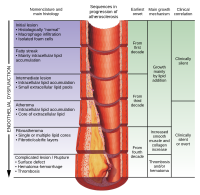
Photo from wikipedia
Circulating cell-derived microvesicles (MV) represent a subject of increasing interest in recent years as potential effectors in thrombosis, inflammation and vascular injury. Although several studies demonstrated an association between MV… Click to show full abstract
Circulating cell-derived microvesicles (MV) represent a subject of increasing interest in recent years as potential effectors in thrombosis, inflammation and vascular injury. Although several studies demonstrated an association between MV plasma concentrations and clinical manifestations of atherosclerosis as well as a clear effect of cardiovascular pharmacotherapy on MV formation pattern, the application of this promising biomarkers in clinical cardiology has been hindered so far due to heterogeneity of the hitherto studies employing non-standardized methodologies. Recently great progresses have been done and international initiatives were started to unify the pre-analytical and analytical procedures, improve the comparison of measurements between the laboratories and increase detector sensitivity of flow cytometry - a golden standard for MV assessment. Likewise, the concept of a "therapeutic window" of P2Y12 inhibitor therapy was introduced, as the prognostic significance of bleeding consequences is equally important with that of ischemic events, particularly with the expanding use of more potent P2Y12 inhibitors. In this review we summarize currently available studies on circulating MV in terms of cardiovascular diagnosis, risk stratification and influence of antiplatelet agents on the MV release to postulate possible future role of MV as supplementary biomarker in monitoring of individual response to antiplatelet therapy. Methodological pitfalls faced in the previous studies and obstacles that need to be addressed before further trials and translation of MV-based assays into clinical practice were defined.
Journal Title: International journal of cardiology
Year Published: 2017
Link to full text (if available)
Share on Social Media: Sign Up to like & get
recommendations!